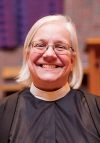As we begin calendar year 2020, I’m reminded that “20/20” is also the term we use to describe clarity of vision. How can the ELCA see Jesus more clearly in 2020? Are there cataracts that need to be removed? Astigmatisms that need to be corrected?
What will it take to get our vision to 20/20?
Since the “Deeper understandings” column began, its authors have primarily been seminary faculty, with occasional college faculty, bishops and others. There have been voices of color among the authors, but the column has often reflected the ELCA’s dominant white demographic.
For the rest of this year, “Deeper understandings” authors will be scholars and church leaders of color. For the most part, they won’t be members of ELCA faculties. Authors will be graduate students, pastors with advanced theological degrees and others whose voices this church needs to hear but all too often doesn’t have an opportunity to hear.
Sometimes we talk about “underrepresented” populations, but we don’t always stop to ask ourselves why some people are less present in our pews, in our pulpits and in our faculties. What social, economic and even religious forces have kept some groups of people from participating more fully in our common life? How has the church been diminished by not benefiting from their gifts?
When the ELCA was established, we set ourselves the goal to have at least 10% of our membership be people of color or whose primary language was other than English within the first 10 years of our life as a church. More than 30 years have passed, and we still haven’t reached that goal. According to the 2014 Religious Landscape Study by the Pew Research Center, the ELCA is the whitest Christian denomination in the United States. Why? What has kept us from achieving—or even exceeding—our goal?
This is not just a sociological or political issue. It’s a theological issue.
The gospel is God’s promise in Jesus Christ, bringing with it the power to transform our brokenness and to bring us to new life, as individuals and as a community.
For several years now, when I preach on Reformation Day, I talk about Dylann Roof. He is the young white man who walked into Emanuel African Methodist Episcopal Church in Charleston, S.C., in 2015 and shot and killed nine African Americans who were attending a Bible study. Roof was an ELCA member.
As Lutheran Christians, we preach a powerful message of God’s unlimited, undeserved grace. I can’t help wondering why that message didn’t get through to Roof. The gospel is God’s promise in Jesus Christ, bringing with it the power to transform our brokenness and to bring us to new life, as individuals and as a community. And yet, Roof found a more compelling power in white supremacy than in the gospel of Jesus Christ.
Church, we must do better!
In 2016, the ELCA Churchwide Assembly approved the creation of a task force, composed entirely of people of color, to develop a strategy for moving toward authentic diversity in this church. The phrase “authentic diversity” expresses the conviction that diversity is not just about the numbers—it is about faithfully reflecting the diverse nature of the communities and society in which we live. It requires removing the obstacles that have limited this church’s diversity, despite our good intentions. It requires working proactively to build a faith community where all are welcome, valued and heard.
The report and recommendations of the task force for strategic authentic diversity presented to the 2019 Churchwide Assembly call for metanoia, a change of heart and mind—and of action. When Jesus announced: “The kingdom of God has come near; repent, and believe in the good news” (Mark 1:15), the Greek word that we translate as “repent” is a form of the word metanoia.
The first of Martin Luther’s 95 Theses picks up on this theme as well: “When our Lord and Master Jesus Christ said ‘Repent,’ he willed the entire life of believers to be one of repentance.” Our church has said that part of this metanoia, this repentance, is to name and reject white privilege and to work to dismantle structural racism.
One specific recommendation from the task force calls on this church “to welcome the gifts, skills, and bodies of work of theologians and lay leaders from marginalized communities, and to promote and distribute the opportunities for learning from the work of theologians, teachers and leaders from marginalized communities.” In 2020, “Deeper understandings” will be a platform for this work.
It is my prayer that hearing these voices will give us new insights and call us to the hard work of repentance and reconciliation. Loren Mead began his book The Once and Future Church (Rowman & Littlefield, 1991) with this sentence: “God is always calling us to be more than we have been.” These words are still true today.



